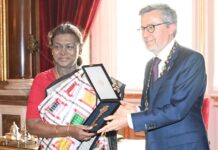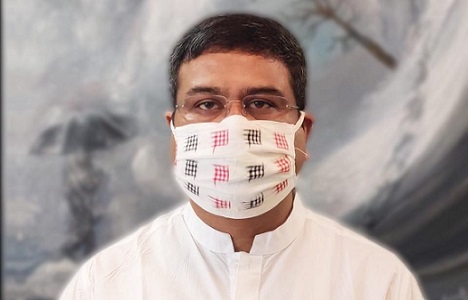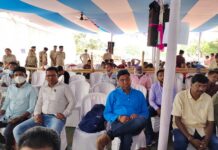By Our Correspondent
NEW DELHI/BHUBANESWAR: While alleging about a large scale illegal export of pellets, which is happening in contravention of the DGFT’s ITC (HS), 2018 Export Policy, the Federation of Indian Mineral Industries(FIMI) has a written a letter to Union STEEL-PNG Minister Dharmendra Pradhan urging him to take necessary action on this issue. In 2016-17, the figure of export of pellets was at 8.81 Million Tonnes followed by 9.31 MT in 2017-18, 9.36 MT in 2018-19, 12.62 MT in 2019-20 and 4.01 MT in 2020-21(April May).
“ We understand that few integrated steel producers are advocating for restriction on iron-ore exports from the country on the plea that the domestic steel industry is not able to meet its full iron ore requirement from the domestic sources. While the domestic steel industry is using only high grade iron ore of +62%Fe, these integrated steel producers want all iron-ore and raw materials in the country to be blocked for their use. On the contrary, the same players have been illegally exporting pellets (usually containing +64% Fe), which is only a substitute for high grade iron-ore lumps and is a precious input needed by the domestic steel and sponge-iron plants,” FIMI’s letter to Union Minister Pradhan, a copy of which is available with www.indianewsdiary.com, said.
“If the illegal exports of pellet continue, it will also undermine the spirit of the National Steel Policy 2017 (NSP) to achieve 300 MT of steel capacity by 2030, which will require substantial amount of pellets as input for steel-making, as shown in table below. In present times when both the domestic mining and metal industry are struggling to cope with the impact of COVID-19, it is essential to immediately impose a complete ban on export of pellets to ensure availability of this high grade material for domestic steel industry. The integrated steel producers and pellet exporters have been twisting the essence of ‘Atmanirbhar Bharat’ – instead of improving their own efficiency, these integrated steel producers are bent on squeezing the upstream (mining) and downstream industries (secondary steel producers and steel consumers like automobiles, railways, infrastructure, etc.). In view of the above, we request you to kindly impose a complete ban on pellet export and also look into the matter of past export of pellets by entities other than KIOCL, as per DGFT’s Export Policy,” the letter said.
“We submit that as per DGFT’s ITC (HS), 2018 Export Policy, only the iron ore pellets manufactured by KIOCL are allowed to be exported. All other pellets producers are therefore exporting pellets in total violation of the Government of India’s policy. Not only they are exporting pellets illegally, they are also claiming 1% duty drawback from the Government. According to our estimate, during 2013-20 there has been illegal export of pellets to the extent of Rs 25,145.36 crores (Rs. 24,896.40 crores as value of exports and Rs. 248.96 crores as duty drawback) by companies other than KIOCL,” the letter said.
“Further, the illegal export of pellets has been rising for the past few years, as can be seen in table below. In addition to huge loss to the exchequer, it has been depriving the domestic steel and sponge iron industry from a precious input. It is alarming that despite the impact of COVID-19, within the first two months of the financial year 2020-21, 4.01 million tonnes of pellet have already been exported. Proportionally, it would amount to pellet export in 2020-21 to the tune of 24 million tonnes, an almost 100% increase compared to the previous year. This will severely hinder any prospects of growth of domestic sponge iron industry,” it said.
“The hypocrisy of the pellet exporters can be observed from the fact that they are advocating scarcity of raw materials (iron-ore) on one hand and illegally exporting pellets, which is a much more precious commodity containing +64% Fe. These integrated steel producers have been creating an unwarranted scare that raw material is being exported. India is endowed with rich iron-ore resources to the tune of 33 billion tonnes and thus is capable of not only meeting the domestic requirements, but also becoming a major global exporter of iron-ore. However, due to lifting of only selective high grade iron ore (+62% Fe) by domestic steel industry, 162 million tonnes of iron ore stock (mainly of +58%Fe to 62%Fe) has been lying unused in the country for decades. Out of these, 137 million tonnes of iron ore is lying in the States of Odisha and Jharkhand itself. These stockpiles contain +58%Fe to 62%Fe content iron-ore and are not required by the domestic steel industry,” the FIMI letter written by its Secretary General, RK Sharma said.
“If these mine-heads stocks are not utilized / liquidated, it will flow into nearby rivers and rivulets in the rainy season and affect the agriculture fields due to strong winds in summer. Since, majority of the mines are small and have space constraints, the stockpile at mine-head severely limits the capacity of these mines to undertake scientific mining and realise their full potential. Neither the integrated steel, sponge-iron or pellet producers are purchasing this iron-ore nor are they allowing it to be exported. Therefore, it is essential to liquidate these stocks either by way of supplying to domestic steel industry at international prices or by removing the export duty on iron-ore. This will lead to increased economic and employment activities in mining, along with earning foreign exchange and revenue for the Government, augmenting the efforts towards Atmanirbhar Bharat,” it said.
“In addition to illegal export of pellets, these integrated steel producers are also engaged in various unfair practices which are resulting in restricted rake allocation for iron-ore export, especially in South Eastern and East Coast Railway zones. While iron ore indents face restrictions such as indent validity of 60 days, mandate for showing proof of ownership etc., pellets do not have these restrictions and thus receive undue advantage including seniority position in indent allocation list, more number of rakes, possibility of booking rakes in the name of multiple companies without pellet ownership, etc.Such practices by pellet producers is derailing the mining industry and is resulting in restrictive rake allocation for iron-ore export, while the erstwhile lessees have very limited time until 31st October, 2020 to liquidate / export the iron-ore and add to Government revenues. Hence, the allocation of rakes should be prioritized for iron-ore export and allocation of rakes should be immediately stopped to the pellet producers other than KIOCL, as it is outright illegal,” the letter argued.






















